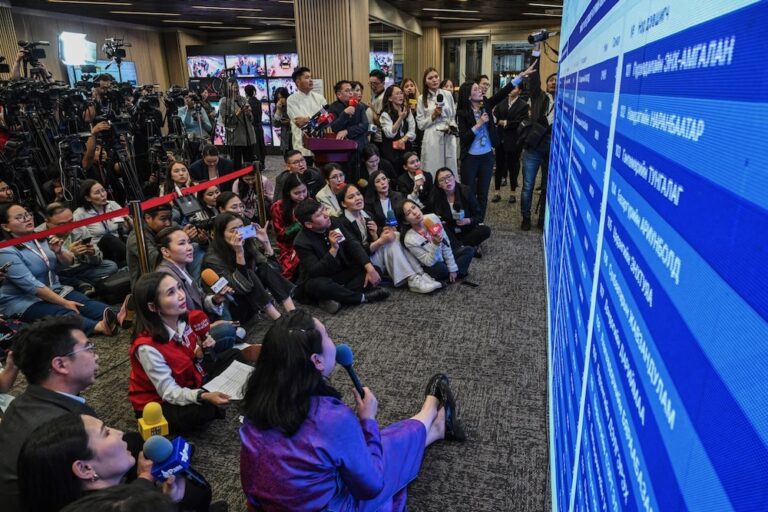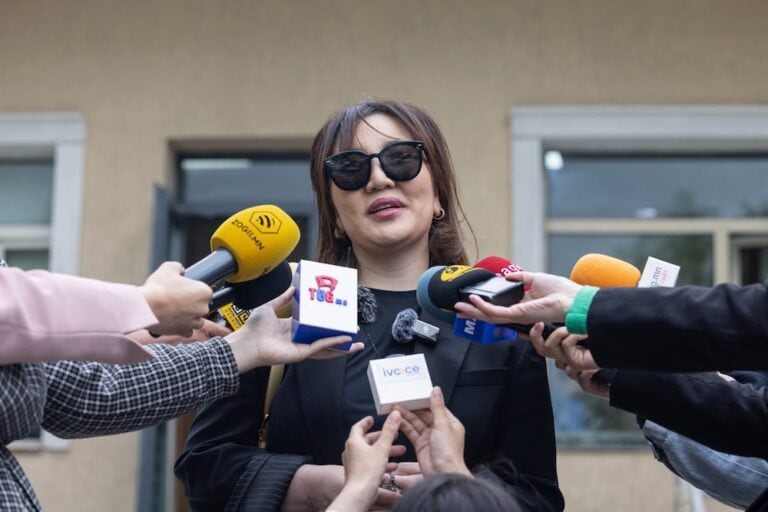(Globe International/IFEX) – The following is a Globe International press release: JOURNALISTS PLEASED WITH DRAFT LAW OF MONGOLIA ON FREEDOM OF INFORMATION BEING SUBMITTED TO PARLIAMENT Globe International and the Open Society Forum in Mongolia organized a roundtable, “Against censorship!”, on 2 May 2007, on the occasion of World Press Freedom Day. This day also […]
(Globe International/IFEX) – The following is a Globe International press release:
JOURNALISTS PLEASED WITH DRAFT LAW OF MONGOLIA ON FREEDOM OF INFORMATION BEING SUBMITTED TO PARLIAMENT
Globe International and the Open Society Forum in Mongolia organized a roundtable, “Against censorship!”, on 2 May 2007, on the occasion of World Press Freedom Day. This day also witnessed several members of Parliament submitting a draft law on freedom of information. A public discussion on the draft law took place in the Open Society Forum’s premises on 7 May.
During the meeting, Globe International presented IFEX alerts on violations of the right of free speech in Mongolia, and mass media experts made presentations. On World Press Freedom Day, all daily newspapers and television channels featured news, articles and programmes on the challenges journalists face in Mongolia. Articles such as “Stop censoring journalists”, “Some provisions of Criminal Code are veered against journalists”, “Who is controlling media?” appeared on newspapers.
In his presentation during the round-table “Against censorship!”, Ts. Munkhtur, editor-in-chief of Mongolian National Public Broadcaster’s MM agency, stressed that Mongolian journalists are working in fear of the desperate economic situation that forces them to conform to their bosses’ opinion. It has become quite widespread to have key politicians and business groups from both Mongolian People’s Revolutionary Party and Democratic Party set up their own media outlets and exercise full control over them. Local media can only publish official information provided by local governments, or risk losing financial support from the local budget on which they totally depend. They have turned into local officials’ “public relations agents”.
Munkhtur also mentioned that some media have fallen under the control of companies that provide them with advertising, which is their main source of income.
Meanwhile, journalist G. Enkhbaatar of the daily newspaper “Ardiin Erkh” stressed that some laws are hampering investigative journalism.
Globe International lawyer G. Davaakhuu pointed out that difficulties arising in the course of defending journalists stem from the lack of clarity in some legal provisions. For instance, Article 110 of the Criminal Code stipulates that “if somebody’s dignity and reputation have been insulted either publicly or through the media . . . ” this act is considered a crime and is liable for penalties. Davaakhuu noted that it is not clear what is understood by the word “insult”.
Vice-Minister for Home Affairs and Justice Sh. Sukhbaatar stressed that it is not appropriate to punish journalists for what they write, as allowed by the Criminal Code.
Participants in the roundtable unanimously adopted a petition reminding all of the need to abide by the Media Freedom Law. Globe International circulated the petition to members of the Mongolian Parliament.
S. Batbold, one of the six Members of Parliament who submitted the draft law on freedom of information, met with journalists and solicited their views. The journalists said they were pleased that the draft law, which will safeguard their right to obtain information, will be considered by the Parliament’s two standing committees. They also noted that should organizations issue their own lists of secrets, the right to obtain information will again be subject to violation.
The draft law was developed in 2005 with the support of Globe International. The draft was based on comments received from ARTICLE 19, an international human rights organization that defends and promotes freedom of expression and freedom of information all over the world. The legislation was conceived to ensure the right of the people to seek and gain access to any kind of information, except that which is classified as secret by the Civil Code.
For more information about the Mongolian law on freedom of information, see:
http://www.openforum.mn/index.php?cid=98#LawInformation


